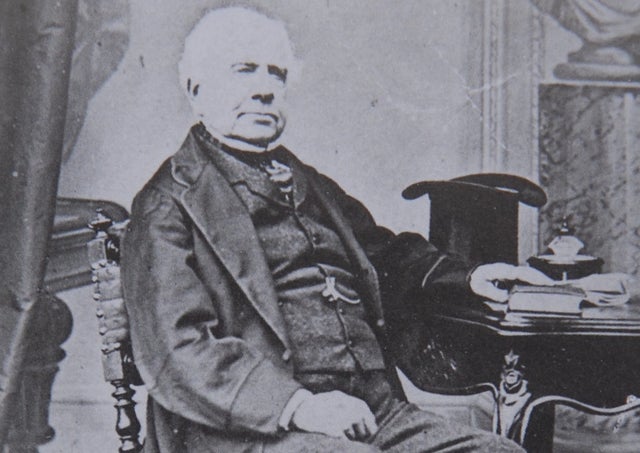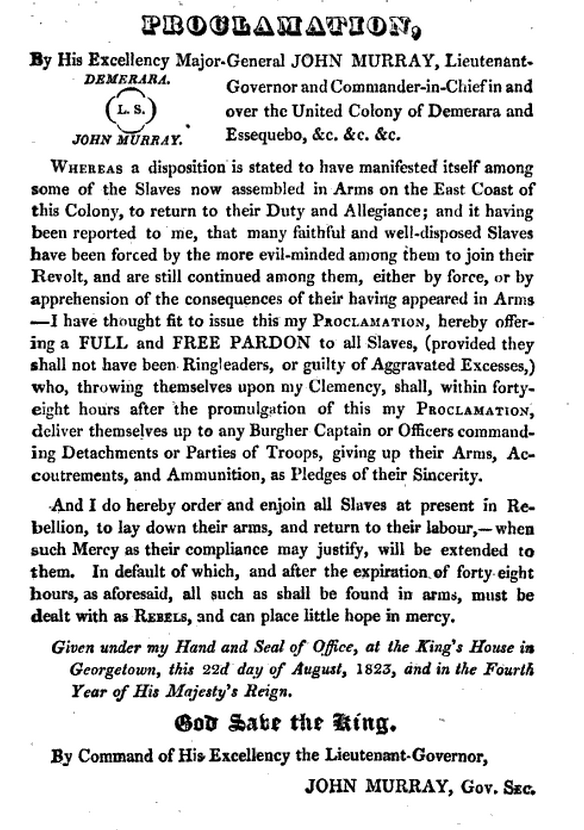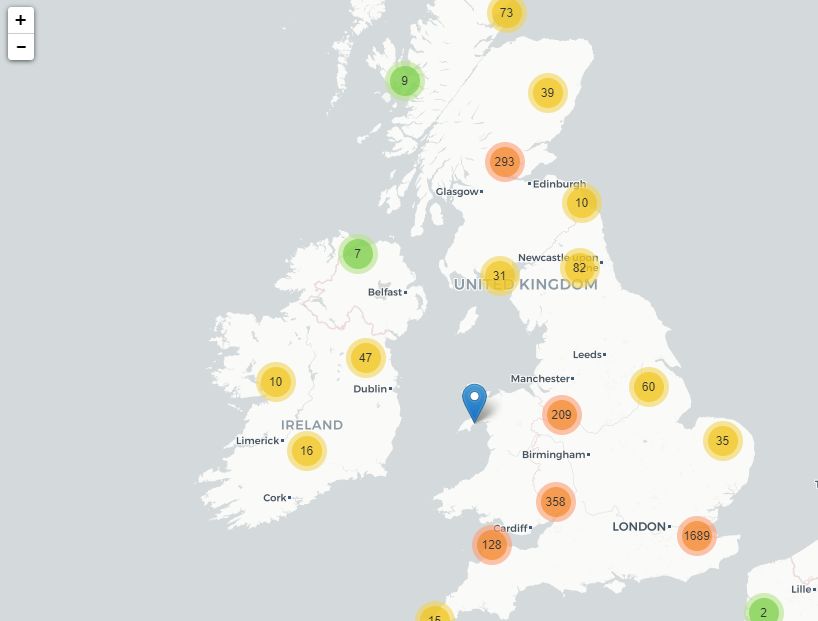Who benefitted from slavery in Ireland? When it was abolished in British colonies in 1833, the equivalent of £millions of pounds was paid out in compensation to almost 100 slave owners at 80 addresses across Ireland, incl 21 addresses in what is present day Northern Ireland. 1/
Almost all the men and women awarded compensation for loss of 'property' (i.e. enslaved humans) under the 1833 Abolition Act are listed in a Parliamentary Return, an official reply to a request from Irish MP and anti-slavery advocate, Daniel O'Connell.
Researchers @ucl have turned this info plus lots of other historical records into an online database, complete with maps and names of slave owners. Each marker on the map represents an address - a slave-owner or direct beneficiary of the slave trade. 3/ https://www.ucl.ac.uk/lbs/maps/britain/#zoom=7&lng=-6.503906&lat=53.572938
Money earned from slavery and from compensation often went into local economies, financing new businesses, passed on in philanthropy. That well-respected pillar of society may have earned their money through the enslavement of fellow humans. Sound familiar? 4/
Let's follow the trail of one such local man, Charles McGarel of Larne in Co Antrim.
His entry in the Oxford Dictionary of National Biography (published in 2016) lists him as 'merchant and slave-owner'. 5/
His entry in the Oxford Dictionary of National Biography (published in 2016) lists him as 'merchant and slave-owner'. 5/
Charles McGarel was born around 1788 in Larne, son of a local innkeeper or cobbler. As a young man, he went with at least two of his brothers to what was then Demerara on the coast of South America, in present-day Guyana. 6/
This Dutch possession was captured in 1796 & again in 1803, formally becoming a British colony in 1814. This was a sugar frontier, highly profitable, hungry for new slaves despite the ban on the African slave trade in 1807, to which the colony in Demerera was subject. 7/
Here's a newspaper advert for some Demerara sugar for sale in North Street in Belfast in 1824 (h/t @Limerick1914).
It was a horrible, cruel business. Unsurprisingly, the slaves revolted. Here's a proclamation from the Lieutenant Governor in response to an uprising in 1823, just a few months before that Belfast sugar sale. (h/t @Limerick1914) 9/
And here's what happened to those who didn't give themselves up "to the mercy" of the Lieutenant Governor were captured instead. (h/t @Limerick1914) 10/
When the UK government subsequently moved to abolish slavery, Charles McGarel and his business partners fought tooth and nail. Now back in London, he was among the 65 absentee slave-owners who petitioned the Privy Council in 1826 against compulsory manumission (emancipation). 11/
Indeed, according to UCL, McGarel himself served on the Committee of five appointed to pursue the appeal, which was heard in July 1827 and appears to have stalemated the British government’s efforts to enforce compulsory manumission. 12/
In the 1830s, McGarel and his partners were some of the major beneficiaries of slave compensation.
£22846 for the the Endragt and Mon Repos estates and the 456 enslaved people.
£7300 for 135 enslaved on Philadelphia estate.
£17110 for the Hamburg estate with 329 enslaved. 13/
£22846 for the the Endragt and Mon Repos estates and the 456 enslaved people.
£7300 for 135 enslaved on Philadelphia estate.
£17110 for the Hamburg estate with 329 enslaved. 13/
£856 for 16 enslaved at Cumings Lodge.
£13417 for the Uniform estate and the 253 slaves.
£9751 for 184 slaves on Nouvelle Flandres....
In total, McGarel and partners got about £100 million in today's money from the taxpayer in compensation for some 2,489 slaves. 14/
£13417 for the Uniform estate and the 253 slaves.
£9751 for 184 slaves on Nouvelle Flandres....
In total, McGarel and partners got about £100 million in today's money from the taxpayer in compensation for some 2,489 slaves. 14/
Now living in London, McGarel's money went into funding the industrial revolution, investing in iron and railways, among other things. He also bought land and an estate at Magheramorne near Larne in 1842. He subsequently lived between there and London. 15/
He left his estate outside Larne to his brother-in-law Sir James McGarel-Hogg, who built a grand house which subsequently became the Magheramorne House Hotel. As a child, I remember it well as the place our family occasionally went to for Sunday dinners on VERY special days. 16/
He was also a philanthropist. McGarel funded National Schools in Larne. He also endowed buildings: Larne the Town Hall is known as the McGarel Town Hall, built in 1869. 17/
I was at a lovely wedding there a few years ago. A beautiful building and a great day out it was too. 18/
In 2004, it is reported, a plaque was installed there commemorating him as a generous benefactor. No mention of the source of his wealth beyond being "a successful merchant in the sugar industry of the West Indies". 19/
There's also McGarel cemetery, built on land he donated in 1862, and McGarel almshouses, built in 1875. 20/
This classical sculpture of McGarel is apparently on display at Larne Museum and Arts Centre. The inscription commemorates his generosity but again, curiously, carries no mention of the real source of his wealth. 21/
He died at the ripe old age of 88, a very wealthy man in Brighton, in 1876. He left some £500,000, making him one of the richest men in Britain dying that year. More on his life story here: https://en.wikipedia.org/wiki/Charles_McGarel and here: http://wwwdepts-live.ucl.ac.uk/lbs/person/view/6914 22/
So who benefitted? On the backs of men, women and children in bondage, great wealth was generated, fuelling commerce, jobs, charities, schools, and buildings across Ireland & Britain. Our present day prosperity is, in part, due to the enslavement of previous generations. 23/
Slavery has left many legacies. Public buildings, statues, inherited wealth, prejudice, inequality, discrimination, brutality. Our shared history. Our present reality.
We can now all help to address that legacy by saying the injustice stops now, that #BlackLivesMatter
24/24.
We can now all help to address that legacy by saying the injustice stops now, that #BlackLivesMatter

24/24.
Some postscripts:
To learn more, visit the UCL website at the link below, including for zoomable, searchable maps and much more: http://wwwdepts-live.ucl.ac.uk/lbs/
They're on Twitter at @LBS_at_UCL
To learn more, visit the UCL website at the link below, including for zoomable, searchable maps and much more: http://wwwdepts-live.ucl.ac.uk/lbs/
They're on Twitter at @LBS_at_UCL
Also well worth following is historian Liam Hogan, @Limerick1914, who is brilliant on the Irish dimension to slavery and the slave trade, and even on the politics of statues.
And if you think this thread was long, you haven't seen Liam's...
And if you think this thread was long, you haven't seen Liam's...
And some viewing: Britain's Forgotten Slave Owners
Two-part 2015 BBC documentary by @DavidOlusoga on the abolition of slavery. Huge sums of money were paid out in compensation, not to slaves, but to slave owners.
Part 1 not on iPlayer but available here: https://dai.ly/x2yi7o6
Two-part 2015 BBC documentary by @DavidOlusoga on the abolition of slavery. Huge sums of money were paid out in compensation, not to slaves, but to slave owners.
Part 1 not on iPlayer but available here: https://dai.ly/x2yi7o6
Britain's Forgotten Slave Owners, Episode 2: The Price of Freedom
@DavidOlusoga traces the bitter propaganda war waged between the pro-slavery lobby and the abolitionists.
Again, not currently on iPlayer but available here:
https://dai.ly/x77iw55
@DavidOlusoga traces the bitter propaganda war waged between the pro-slavery lobby and the abolitionists.
Again, not currently on iPlayer but available here:
https://dai.ly/x77iw55
New thread on Irish nationalist hero, and pro-slavery advocate, John Mitchel, which may also be of interest: https://twitter.com/patrickcorrigan/status/1271204371762642944?s=21 https://twitter.com/PatrickCorrigan/status/1271204371762642944

 Read on Twitter
Read on Twitter



















